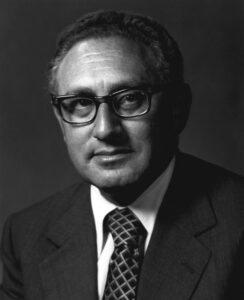The recent death of former National Security Advisor Henry Kissinger provides an opportunity to revisit one of Kissinger’s most infamous acts — the role he played in the 1970 kidnapping and murder of Gen. René Schneider, the overall commander of the Chilean Armed Forces.
Let me emphasize one thing right off the bat: Schneider was an entirely innocent man. Why, he wasn’t even a communist. Instead, he was simply a man of great integrity who believed that he had a responsibility to support and defend the constitution of Chile. That’s what got him killed.
In the 1970 presidential election in Chile, a socialist named Salvador Allende received a plurality of the votes. Since he had not received a majority, the election was thrown into the hands of the Chilean congress.
U.S. President Richard Nixon, Kissinger, and CIA officials decided that U.S. “national security” would be threatened by the election of a socialist president in Chile.
 So, Nixon, Kissinger, and the CIA conspired to produce a two-level plan to prevent Allende from assuming the presidency. The first level involved the secret payment of bribes to the members of the Chilean congress, using, of course, U.S. taxpayer money. The second level was more ominous — to persuade the Chilean national-security branch to take charge of the Chilean government. (Chile was a national-security state, just as the U.S. had become.)
So, Nixon, Kissinger, and the CIA conspired to produce a two-level plan to prevent Allende from assuming the presidency. The first level involved the secret payment of bribes to the members of the Chilean congress, using, of course, U.S. taxpayer money. The second level was more ominous — to persuade the Chilean national-security branch to take charge of the Chilean government. (Chile was a national-security state, just as the U.S. had become.)
However, Gen. Schneider said no. He continued standing steadfastly in support and defense of the Chilean constitution, which did not provide for a national-security coup as a way to “save” the country from a president who, it was claimed, posed a grave threat to Chile’s “national security.”
Nixon, Kissinger, and CIA officials conspired to launch a violent kidnapping of Schneider to remove him as an obstacle to their plot. During the kidnapping attempt, which took place on the streets of Santiago, Schneider fought back. The kidnappers shot him dead.
The Schneider children later sued Kissinger for his role in the conspiracy to kidnap and murder their father. The federal courts threw them out on their ear. The courts held that when it comes to foreign policy, including kidnapping and assassination, the federal courts would never interfere.
Needless to say, the attitude of the Justice Department was the same. Even though there was clear and convincing evidence of a conspiracy involving felonious actions in Washington, D.C., and Langley, Virginia, the Justice Department never sought any indictments for the conspiracy to kidnap and murder an entirely innocent man. After all, it is important to keep in mind the U.S. felony-murder rule, which holds that if a person is murdered as part of a felonious action, all of the parties to the felonious action are criminally liable for the murder, even if they didn’t participate in it or intend it to happen.
Ironically, the Chilean people were so outraged over Schneider’s murder that the Chilean congress was pressured to elect Allende as president. Thus, the bribery part of the U.S. scheme didn’t work either.
Three years later, U.S. officials finally succeeded in ousting Allende from power through a violent U.S.-supported coup that left Allende and some 3,000 innocent Chilean people dead. It also left the Chilean citizenry to suffer under a brutal U.S.-supported military dictator, one in which 50,000 innocent Chilean citizens were violently rounded up and subjected to torture and rape at the hands of Pinochet’s goons. Kissinger had a close relationship with Pinochet and, in fact, visited him in Chile soon after the coup and offered him generous U.S. support for his brutal dictatorship.
For a detailed analysis of the Schneider murder, I recommend reading “The CIA and Chile: Anatomy of an Assassination” on the website of the National Security Archive.
For a good summary of the lawsuit that Schneider’s sons brought against Kissinger — and the deferential attitude of the federal courts toward foreign-policy actions like kidnapping and assassination — see René Schneider et al. v. Henry A. Kissinger et al. on the website of the International Crimes Database.

